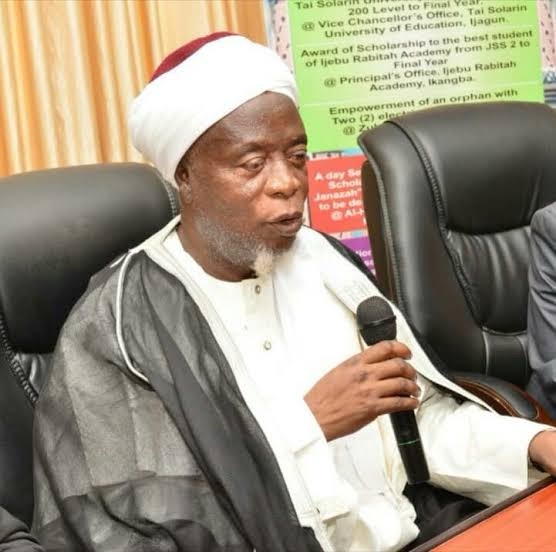

Ijebu-Ode, Ogun State
The Chief Imam of Ijebu Land and Chairman, League of Alfas and Imams in Ijebu Land, Alhaji Miftaudeen Ayanbadejo, has clarified that the late Awujale of Ijebu Land, Oba Sikiru Kayode Adetona, specifically requested a Muslim burial to avoid traditional rites involving alleged ritual killings, a practice the monarch firmly rejected during his lifetime.

In an exclusive interview, the 78-year-old cleric revealed that the monarch had, nearly two decades ago, called a meeting of Muslim, Christian, and traditional leaders at his palace to discuss burial practices for traditional rulers. According to Imam Ayanbadejo, Oba Adetona condemned any form of human sacrifice or secret rituals tied to royal burials and insisted monarchs should be buried according to their personal religious convictions.
“The Awujale told traditionalists point blank: ‘Would you allow your own children to be killed for rituals just because a king died?’ They said no. He then asked why such practices should be tolerated at all,” the Imam recounted.
A Break from Tradition – Rooted in Law and Legacy
Oba Adetona, who passed away recently after a record-breaking reign that began in April 1960, was buried according to Islamic rites. This development, which has stirred controversy among traditional worshippers, is, according to the Imam, not new in Ijebu history. He listed several other monarchs, including the late Ebumawe of Ago Iwoye, Dagburewe of Idowa, and Bejeroku of Oke Agbo, who were also buried by Muslims without interference.
The 2021 amendment to the Obas and Chiefs Law of Ogun State, signed by Governor Dapo Abiodun, officially authorizes monarchs to be buried in line with their religious faiths. Imam Ayanbadejo emphasized that the Muslims were only carrying out the late monarch’s well-documented wish and acting in accordance with the law.
Awujale’s Ascension – Not Guided by Ifa
Addressing critics who argue that Yoruba monarchs must be buried according to traditional customs due to their installation through spiritual rites, the Chief Imam dismissed the claim in Awujale’s case. He recounted that Oba Adetona’s ascension in 1960 had no involvement with divination or the Ifa oracle. Rather, he was chosen for his intelligence, education, and promise.
“There was no Ifa or Opele involved. The Ijebu people amended the rules because they wanted a young, educated leader. The selection was by the will of Allah, not the deities,” he explained.
Warning Against Intimidation and Ritual Claims
Imam Ayanbadejo also rejected claims by some traditionalists that consequences will befall Ijebu Land for not burying the Awujale through traditional rites.
“If anything happens, it is the doing of those who threaten consequences. The Quran is clear—nothing happens without Allah’s permission. The late Awujale lived and died a Muslim; there was no conflict about that,” he declared.
He noted that if Christians and Muslims celebrate their rites openly, traditionalists must also be open and transparent in their practices, instead of hiding behind secrecy and fear tactics.
Ijebu Land is Peaceful, and Will Remain So
Despite the controversy, Imam Ayanbadejo reassured the public that there is no threat of religious conflict in Ijebu Land.
“Ijebu Ode is about 90% Muslim. We have always coexisted peacefully. The noise is just because Kabiyesi was the paramount ruler. But we’ve buried other kings before, and the traditionalists never disturbed us,” he said.
The cleric urged all residents to accept the reality, focus on unity and progress, and respect the late Awujale’s wishes.
Remembering Oba Sikiru Adetona
Describing the late monarch as a man of deep integrity, the Imam recalled his unwavering commitment to truth and justice.
“Awujale could die for you if you were honest. He hated dishonesty. His reign brought rapid development to Ijebu Land. Even when some tried to remove him for political reasons, God preserved his throne,” he said.
Conclusion
As Nigeria continues to navigate the intersection of faith and tradition, the burial of Oba Sikiru Kayode Adetona serves as a landmark event reflecting a shift toward legal and individual religious identity over long-held customs. According to the Chief Imam, this transition is not one of division but of enlightenment and progress.





















